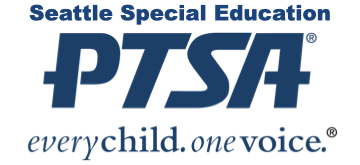Added additional testimony given to the School Board on May 4
With respect to Policy 3208, the Seattle Special Education PTSA continues to be concerned that it does not refer to students with disabilities. We want to emphasize the data we presented at the last School Board meeting showing that people with disabilities, especially intellectual disabilities, are at significantly higher risk of being sexually assaulted or harassed. To ensure accountability when procedures are written, we believe it is important that the policy specifically refer to disabled students, particularly their need for support if they are sexually harassed and their need for sexual health education.
Testimony to the Seattle School Board at its April meeting delivered by Seattle Special Education PTSA President Janis White:
“During today’s meeting, you will be considering an amended sexual harassment policy for students. I was struck by the fact that students with disabilities are not specifically mentioned in the Board Action Report or the policy.
Did you know that people with disabilities, particularly people with developmental or intellectual disabilities, are two to three times more likely than the general public to be the victim of violence or abuse and according to some sources, have as high as a 90% chance of experiencing sexual abuse in their lifetimes? It is also estimated that only 47% of cases of assault against people with disabilities are reported, only 22% of perpetrators are charged with an offense and only 9% are convicted.
The Seattle Special Education PTSA recently partnered with The Arc of King County to learn more about the risks to our disabled students and to talk about these issues.
Why are our children at such a higher risk? Ableism plays a role because in our culture and in our schools, students with disabilities are often overlooked or dismissed. The isolation of students with disabilities in contained classrooms can make it easier for disabled students to become victims. For some students, the inability to communicate makes them into targets. And, many students with disabilities don’t have access to the same sexual education curriculum that neurotypical students receive or in some cases, any sexual education. They need to learn about the names of their body parts, about consent, and about how to tell if someone isn’t treating them right.
When you review the amended policy today, please ask whether it should include recognition of the increased vulnerability of students with disabilities to sexual violence and specific directives to protect our disabled students in Seattle Schools.”
Summarizing what staff provided as initial feedback in answer to Director Harris’ question about the lack of disability reference in the policy. The District policies apply to all of students. New procedures and updated practice areas would focus on students who may be in particular risk groups or may need additional supports, particularly as mentioned in the testimony above for self-contained classrooms and for students with 1:1 aides.

